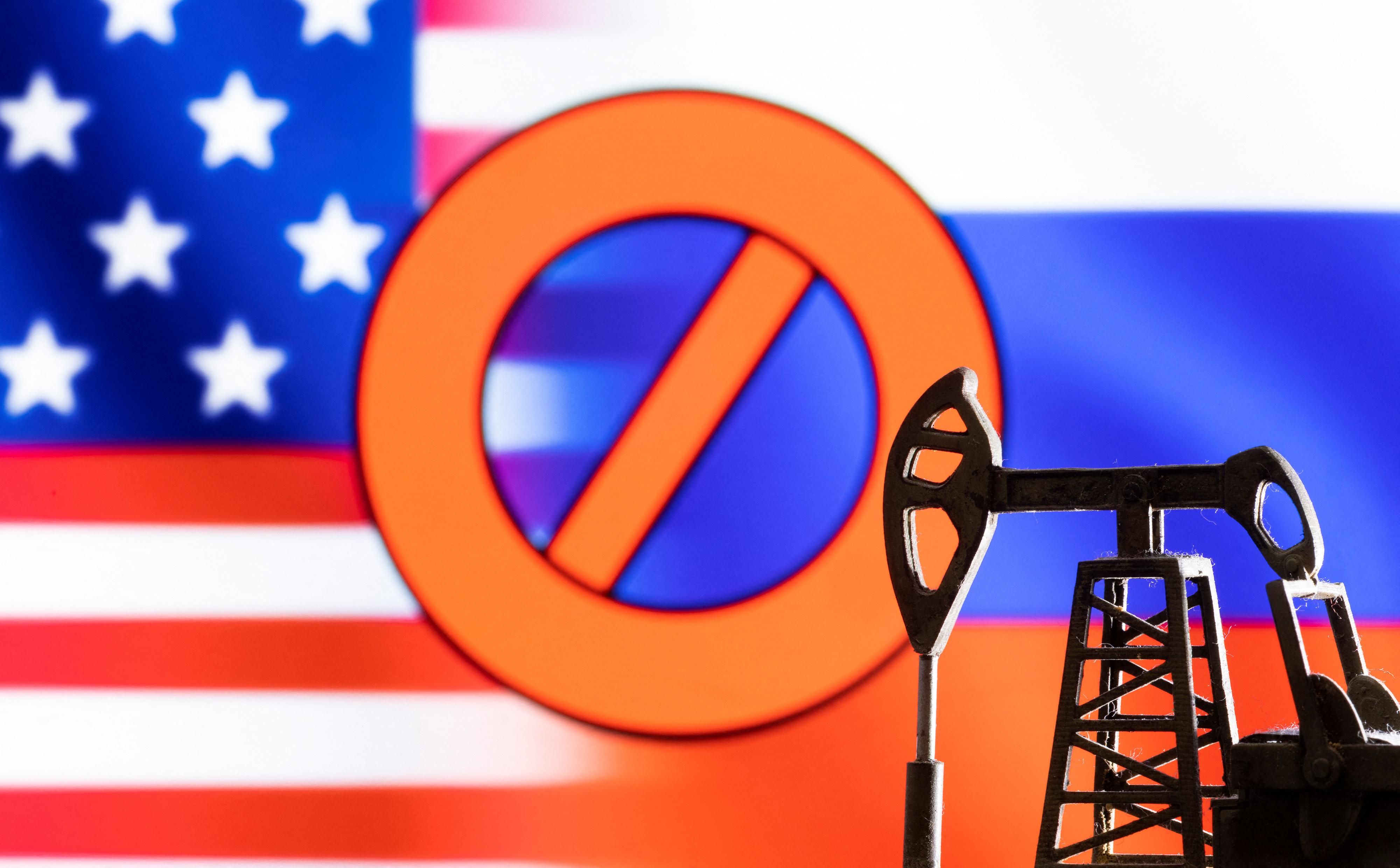Oil ban, Churchill, Polish MiGs, Putin's fixes
Biden bans Russian oil, alone. The US president banned imports of Russian oil on Tuesday in a bid to increase economic pressure on the Kremlin. It’s not clear how effective this will be, given that the US accounts for less than 10% of Russia’s daily exports. Meanwhile, Europe, which slurps up almost half of those exports, has refused to join the oil ban for now, and there is virtually no chance of major customers like China or India turning down Russian crude. Meanwhile, Biden’s move carries political risks at home, as average national gas prices have already hit a record high of $4.17 per gallon — and that's months before the annual price rise normally associated with summer “driving season.” Taking more oil off the market could push pump prices even higher. As we head towards the midterm elections, how much economic pain will Americans take on behalf of Ukraine?
Zelensky plays Churchill. In a video address to a packed House of Commons on Tuesday, Ukraine’s embattled President Volodymyr Zelensky invoked two famous English wordsmiths — William Shakespeare and Winston Churchill — in an impassioned plea for more sanctions against Russia and the imposition of a no-fly zone over Ukraine. “We will fight in the forests, in the fields, on the shores, in the streets,” he said, adapting Churchill’s Dunkirk speech to his own country’s struggle against the Russian war machine. Zelensky received a standing ovation, but there is still little appetite among Western countries to risk direct combat with Russia by enforcing a no-fly zone.
Poland pledges jets to Ukraine … sort of. Warsaw has been firm that it won't transfer any of its MiG-29 jets to Ukraine directly, but it pledged on Tuesday to put them all at Washington’s disposal for onward transfer to Kyiv if America so chooses. It also encouraged other NATO countries to do the same. All the Poles asked in return was that the US send them some fresh combat jets to replace the MiGs. US officials said, however, that the offer was likely untenable, citing logistical concerns and questioning the rationale. Ukrainians have asked for the Polish MiGs because they are based on Soviet-era planes that Ukrainian pilots are familiar with and will thus require minimal training.
Putin tries to blunt the pain. With sanctions increasing and Western firms exiting from Russia, Putin on Tuesday signed a package of economic support measures for Russian people and businesses. The package boosts benefits for pensioners, slashes red tape for businesses, and eases the import and purchase of pharmaceuticals. Over the past two weeks, the Russian ruble has lost nearly a third of its value against the dollar amid the worst economic crisis Russians have faced in a generation.
Pakistani PM in trouble
Pakistan’s embattled Prime Minister Imran Khan will soon face a no-confidence vote. A motion was filed on Tuesday by 100 opposition lawmakers who blame him for the country’s ailing economy and high inflation. After the motion was accepted, opposition supporters took to the streets of the capital, Islamabad, and other cities to demand Khan step down within 24 hours. Khan, for his part, remained defiant, insisting that he'll survive all attempts to unseat him — as he did exactly one year ago. To stay in power, Khan needs 172 votes in the 342-seat assembly, where the ruling Tehreek-e-Insaf Party and its allies have a slim majority. However, eight members of Khan's party have threatened to withdraw their support, so the PM is on very shaky ground. While we wait for the speaker to schedule the no-confidence vote, which could take weeks, all eyes will be on Pakistan’s powerful army, which officially says it stays out of politics but has a long history of doing the opposite in the nuclear-armed nation.
Hong Kong’s COVID apocalypse
Two years in, Hong Kong now has the world’s highest daily per capita death rate from the COVID-19 virus. Authorities in the city-state of 7.5-million were surprised by the mass fatalities among unvaccinated elderly residents who fell ill with the omicron variant. Hong Kong has closely followed China’s zero-COVID policy and shunned mRNA vaccines, which means few people were exposed to the virus and developed antibodies before the latest variant hit. The ongoing COVID crisis has already had political consequences: Hong Kong’s chief executive “election” has been delayed for six weeks. Carrie Lam — the current leader, who has yet to say whether she’ll run for reelection — initially wanted to test the entire population, but powerful business leaders pushed back amid fears of a total lockdown. Hong Kong’s leadership must now decide whether to relax its zero-COVID approach despite rising deaths, or risk more businesses relocating to its longtime competitor Singapore.More For You
Prime Minister Narendra Modi, with President of the European Council António Luís Santos da Costa, and President of the European Commission Ursula von der Leyen, at Hyderabad House, in New Delhi, India, on Jan. 27, 2026.
On Tuesday, the world’s largest single market and the world’s most populous country cinched a deal that will slash or reduce tariffs on the vast majority of the products they trade.
Most Popular
Five forces that shaped 2025
What’s Good Wednesdays™, January 28, 2026
Canadian Prime Minister Mark Carney has repeatedly tussled with US President Donald Trump, whereas Mexican President Claudia Sheinbaum has tried to placate him. The discrepancy raises questions about the best way to approach the US leader.
10,000: The number of Hamas officers that the militant group reportedly wants to incorporate into the US-backed Palestinian administration for Gaza, in the form of a police force.
Walmart is investing $350 billion in US manufacturing. Over two-thirds of the products Walmart buys are made, grown, or assembled in America, like healthy dried fruit from The Ugly Co. The sustainable fruit is sourced directly from fourth-generation farmers in Farmersville, California, and delivered to your neighborhood Walmart shelves. Discover how Walmart's investment is supporting communities and fueling jobs across the nation.
